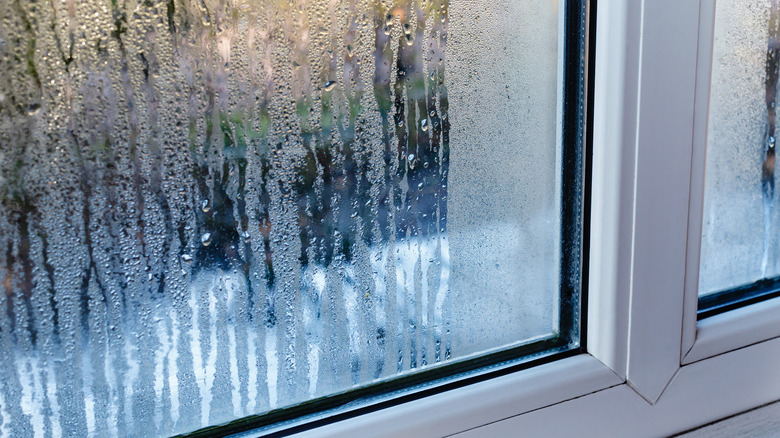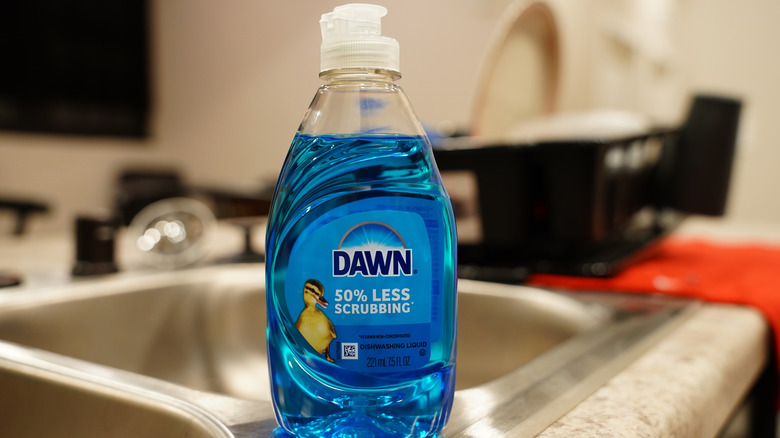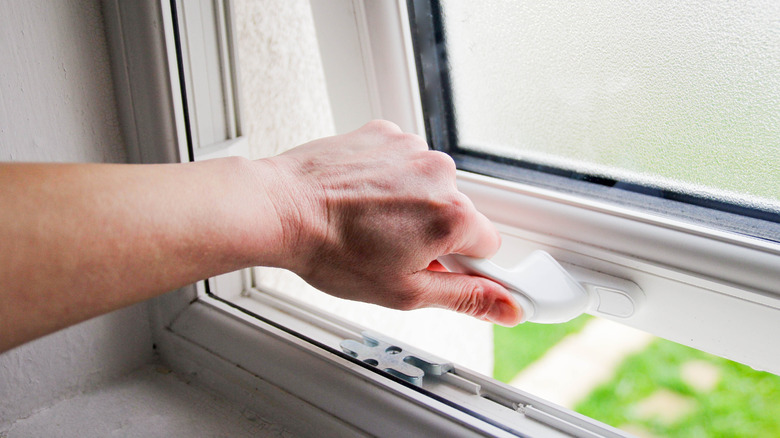Is Dish Soap The Key To Preventing Window Condensation? Here's What We Know
From a laundry trick that can help prevent condensation on windows to TikTok users recommending squirting dish soap on the glass, the internet is full of tricks and tips on how to stop moisture on your windows. But does the dish soap trick work? Yes, but not without several concerns. Here's how it works: the dish soap creates a thin film barrier to prevent water droplets from forming. While that sounds pretty handy, it's only a temporary fix. You'll just have to repeat the process. It's also not the safest way to manage condensation and, according to window experts, it may damage your window fittings. The final verdict is, while windows are among the common things you shouldn't clean with dish soap, you shouldn't "protect" them against condensation with it either.
Condensation is the transformation of water vapor into liquid. It forms on your interior windows on cold, dry days as the warm air inside comes in contact with the windows' cold glass. When condensation constantly fogs up your windows on the chilly days, you might feel frustrated at having to continually wipe it away and start looking for a more permanent solution. Like we said, however, this TikTok hack should be skipped, because you might cause significant harm to your windows and create a bigger problem than just condensation in your home. Here's why.
What dish soap does to your windows
Using a cheap bottle of dish soap to prevent condensation on your windows can add up to a costly problem, especially if you do it repeatedly. Not only will it leave a smeary film or foam on the glass, but applying dish soap to your windows to prevent condensation may damage the windows' rubber seals with repeated use. Damaged seals won't adequately protect your window against moisture, and may result in mold and foggy glass when the moisture seeps between the glass panes in a double-glazed window.
One of the main problems with using dish soap on your windows is that it simply prevents the water droplets from settling on the glass. The moisture can then settle in other areas, such as on your walls, window frame, or ceiling, as it looks for somewhere else to go . You may be left with a costly, moldy mess in your windows and on your walls over time if you repeat this trick. Instead of using dish soap for preventing condensation, try a few alternative methods to tackle the issue in a way that won't harm your home.
Alternatives to dish soap for window condensation
A dehumidifier can be a game changer when it comes to reducing condensation as it removes the moisture from the air. If you don't have one on hand, however, you can make simple changes around your home to prevent window condensation without a dehumidifier. One of the easiest methods is to simply open your windows to let in fresh air and lower the humidity with air circulation. You can also pull back any window coverings, such as curtains, to create better airflow. Consider the fact the kitchen and bathroom are some of the biggest moisture causers in the home. By closing your kitchen door, if present, while you cook, you can keep the moisture from traveling to another room. You can do the same for the bathroom, especially during a hot, steamy shower. You should also use the exhaust fan regularly. Steam consists of moisture, and as the exhaust fan runs, it takes in the moisture, reducing the amount present in the air.
When cold and flu season are upon us, people often turn to a humidifier to help treat stuffy noses and ease breathing. If you continually have condensation, you might want to reduce how much you run your humidifier, move it to another room, or turn it off completely. If you absolutely must have it on, then move it away from any windows or glass where condensation might form to help lessen the problem.


